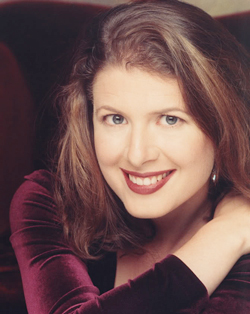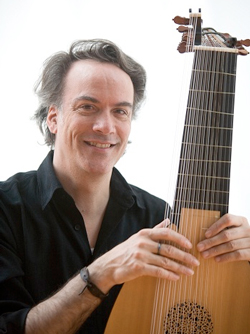by Daniel Hathaway

Hall, who starred in that earlier show, returns to Cleveland this week to rejoin Sylvain Bergeron of Montréal’s Ensemble La Nef; Apollo’s Fire soloists Susanna Gilmore, fiddle, Kathie Stewart, flutes, and Tina Bergmann, hammered dulcimer; and other members of the Countryside Concerts ensemble for six performances of a new summer program called “My Island Home: Songs and Stories of Newfoundland.”
The first three of six performances at the Baroque Music Barn in Hunting Valley begin on Thursday, June 16. Then the show moves to venues in Avon Lake, Chardon, and Bath through June 20. “It’s so rich and vibrant, so funky and delicious, and mystical and musical. ‘Ancient balladry meets kitchen party’ is how I describe it,” Hall said.
Meredith Hall, who is equally at home in opera, art song, oratorio, and folk music, is a native of Newfoundland, whose edge-of-the earth island culture has had a profound effect on her psyche. “I have a summer house there in a very remote place, and local people always say to me, ‘Until outsiders came here telling us how beautiful it is and how lucky we are, we really didn’t see it that way. We were so busy living and working that we didn’t know how different we are from other places, and how much this is to be valued.’”
It took folklorists and musicologists, who began exploring Newfoundland in earnest by the 1920s, to point out the special nature of the island’s musical heritage to its native population. “There was a woman named Elizabeth Bristol Greenleaf who came up from the States and did a lot of wonderful work,” Hall said. “Musicologists wanted to make sure they collected some of our songs before they disappeared off the face of the earth. I think that gave good attention to people who were already stars in their community, but it also helped the whole of the island to stand up and say, ‘Those west coast fiddlers are really something else.’”
Newfoundland is a very special place indeed. “It’s a real outpost,” Hall said. “We didn’t join Canada until 1949, and frankly, there’s not that many of us. This island is 900 kilometers wide and more than that from top to bottom. It has 10,000 miles of coastline. Take the Highlands of Scotland and make it colder and wilder. Add more fog. Make it more beautiful and take away all the people, and there you have Newfoundland.”
Hall went on to explain that while the current population of just around half a million is centered around the main town, St. John’s, it wasn’t always that way. “When I was a child, there were more people living in smaller communities of under 500 people. Each little cove had its own community, and if you lived in a cove, you fished.
“We had a bit of logging, a tiny bit of mining, and a tiny, tiny bit of paper industry on the west coast, but primarily it was a family-based fishing economy. Everybody went into the woods and shot their own food and lived on what came out of their gardens, a single crop of root vegetables. The only things they were getting from merchants were flour, tea and sugar, and made cloth. Anything else was a pure luxury.”
Hall said that way of life persisted right up until the 1960s. “My grandmother lived on the outskirts of a town but had no running water, no electricity, no schooling — she had to leave school when she was eight years old because her mother died and she needed to look after the children and make some money. She went from that to seeing a man walk on the moon. She had thirteen children — only eight lived — four boarders, and a wood stove. She was making bread every day for years. My grandmother thought that Wonder Bread was the best thing ever. Imagine. That life was similar to rural communities elsewhere, but it was all intensified and went on longer because we were an island.”
When some of the trappings of modern American life — like television and McDonald’s — first established themselves, Hall said she enjoyed the benefit of living in two cultures. “We could see what was happening in the outside world, but we had our own traditions going on as well. People made their own instruments, like fiddles. People played spoons — that was the percussion — and people sang. I didn’t grow up in what would be considered a musical family at all, but a storytelling family. But that didn’t mean we didn’t sing. ‘Musical’ meant that you could play instruments. My grandmother could sing, but my grandfather was a storyteller.”
Hall thought for a moment and came up with an example of how she straddled two cultures. “I knew all the words to The Night Chicago Died, whatever year it came out — I might have been seven or eight — but I also knew all the words to The Butcher Boy [sings: ‘In Dublin Town…’]. That kind of Irish song was being sung around the house all the time, along with the Newfoundland songs that everybody, grownups and kids, just knew, like The Star of Logy Bay.”
Those songs live on, not only through traditional word-of-mouth transmission and the efforts of collectors, but also through the kind of adaptation that keeps the repertoire fresh and alive. “Now there’s a wonderful archive of recordings and transcriptions that has become the source for young people who want to pursue traditional music, or who want to mix it with rock,” Hall said. “And Newfoundland rock has become fantastically successful through bands like Great Big Sea. About half their music is originals influenced or inspired by Newfoundland folk song. The other half is folk rock versions of traditional songs, and they’ve toured successfully with that for 20 years.”
While Hall respects the traditions, she’s no purist. “I think these songs — many of which date back to the 1600s or 1700s or even earlier — are re-created in each generation, so what we’re doing in the Apollo’s Fire show is not traditional at all, but an homage. It’s a way of saying that this music moves through us. It takes only one person to seed a song somewhere, and then it gets nurtured and hybridized in that community, and if you discover something strange and wonderful in it, you become part of a process. It makes you feel like a farmer who’s found an ancient rootstock. Nobody says I have to preserve it precisely as it was — but if I don’t do something with it and just let it die with me, then I’ve not done my part.”
The genesis of “My Island Home” goes back to a program Hall and Sylvain Bergeron performed in Montréal in the late 1990s. “We started out with mostly baroque repertoire, then we’d do an audience pleaser of folk music at the end. Then the audience pleasers started getting longer and longer.” One thing led to another, and soon a program entirely devoted to Newfoundland songs came into focus. “Sylvain was collaborating with a lot of folk and rock musicians at the time, and he just kind of went out on a limb,” Hall said. “So the songs had a slightly funkier vibe that has stayed with us. I like to think that Newfoundland is the last outpost before you get to the Atlantic, Iceland, and Ireland. It’s just jutting out there on the edge — and the songs are doing that too.
“What is it that makes this particular program so unique?” Hall asked herself. “What is that feeling we’re trying to get across? I would say it comes down to the kind of magic I feel when I’m out on the edge of a rocky, barren cliff in Newfoundland looking out at the waves just bashing in. In Newfoundland, even if there’s no actual mist in the air, there’s always the anticipation of mist at any moment. It’s in that salt air and in that wetness of the air coming off the water. And the peaty smell, the juniper smell that comes off the land, and the wild roses. It’s got a kind of wild magic to it.”
How will she organize the Apollo’s Fire program? “I’ll tell a few stories, I might even try a recitation, something my grandfather’s generation would have known really well. Those recitations, like the old songs, tend to go on for about 29 verses, so I’ll have to do a little curtailing or people will be there all night. But the music of the show will focus in on the really spine-tingling tunes, the haunting tunes. It’s meditative, but it’s also got an earthy quality. Some of the songs are heartbreaking, and then there are some I can only describe as ancient.”
Closing out our conversation, Meredith Hall added, “If you like traditional folk music, I think you’ll get a lot out of this. If you like folk rock and you open your ears, you’ll like this music as well. And if you like to watch Baroque musicians going out on a limb, you’ll like this show.”
Published on ClevelandClassical.com June 14, 2016.
Click here for a printable copy of this article




